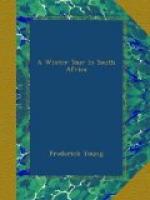system should be changed, and that those who were
living outside the borders of the British Isles
should have their true participation in the government
of the Empire. This led him to a point on
which there was very much misunderstanding on the part
of those who had heard the subject of Imperial
Federation mentioned, and who thought there must
be some idea of those who advocated it at Home
getting some advantage over their colonial brethren,
and draw them into a net, by which they would have
to part with their rights of local self-government.
He utterly denied that there were any such intentions—on
the contrary, this was an invitation to them,
a cry from the Old Country, asking them to come and
assist in governing the Empire. This could only
be effected by Imperial Federation, which would
mean the termination of what was called the rule
of Downing Street, which would be superseded by something
far different, and, in his opinion, be far more acceptable
to the colonists themselves. They would not have
to suffer, as they had in the past, in many ways,
from ignorance, prejudice, and narrow views,
but they would have an opportunity of taking
part in the policy of the Empire, particularly in that
which affected themselves. In consequence
of the agitation at Home during the past few
years a successful attempt had been made to establish
what was called the Imperial Federation League,
of which he was an active member, and which took
no part in party politics, and was at the present
moment presided over by Lord Rosebery, with the Hon.
E. Stanhope, the present Minister of War, as
Vice-President, who, so far as party politics
were concerned, were on totally different sides.
That would prove that in England they did not regard
this great question as one of party politics.
One of the most important results in connection
with that League had been the celebrated Colonial
Conference, which the League had been able to induce
the Government to summon two years ago at Westminster.
They all knew what a remarkable gathering that
was, which was presided over by Lord Knutsford
(then Sir Henry Holland), the summons being responded
to by the self-governing Colonies of the Empire sending
their foremost men to represent their interests.
From South Africa were sent such men as Sir Thomas
Upington, Sir John Robinson, and Mr. Hofmeyr,
and he confessed that, when he had the honour of being
at the first meeting of the Conference, and seeing
these men gathered in the Foreign Office, and
having present the Prime Minister, Lord Salisbury,
if his dream of Imperial Federation was to be
anything more than a dream, he felt that these were
the first symptoms of its realization. It
was the first time in history that the Colonies
of Great Britain had come to the Mother Country to
consult on great National questions. He had
read nearly the whole of the large Blue Book
which contained the reports of the Conference,
and all he could say was that he challenged any assembly
of public men to meet together and show more ability




